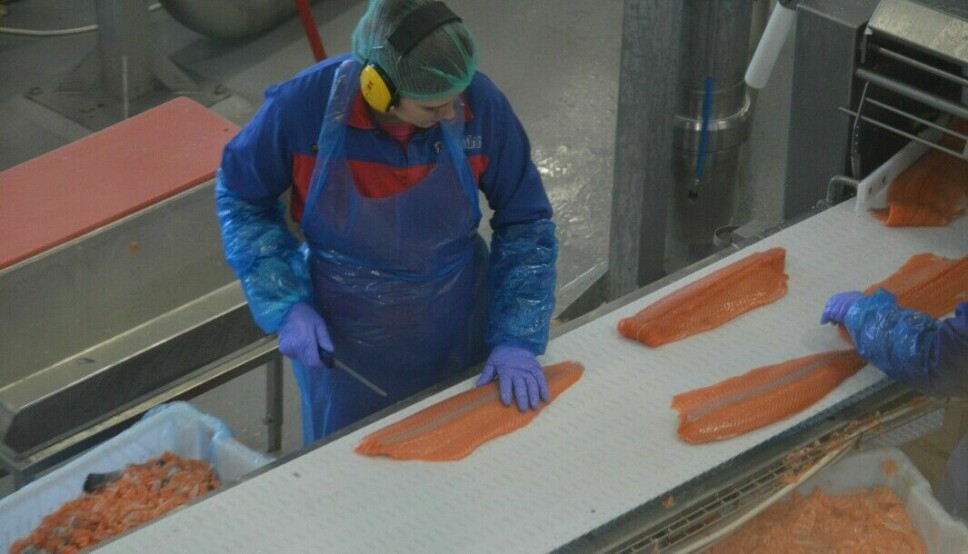
SalMar laying off 851 processing workers in Norway
Farmer says 696 of job losses are due to effects of proposed salmon tax
Scottish Sea Farms co-owner SalMar has today sent lay-off notices to 851 employees at the company’s processing facilities in Frøya, in the north of central Norway, and Senja, in the country’s Arctic north.
SalMar blamed the majority of lay-offs on the fact that it cannot find customers willing to enter into fixed-price contracts due to the government’s proposal for a new 40% salmon tax which it says has destroyed the market for such contracts.
“Such contracts are usually entered into well in advance of deliveries and are absolutely necessary in order to fill the facilities with enough processing activity. 696 of those affected by the notice are associated with further (secondary) processing at the two plants,” SalMar said in a press release.
“The remaining 155 will be associated with the slaughterhouse at InnovaMar on Frøya and this is due to normal fluctuations and lower slaughter volume in the winter months. Limited redundancies linked to slaughter volume have been the norm for many years.”
'No contracts any more'
SalMar, which is the world’s second-largest salmon farmer by volume, said it will do its utmost to ensure that workers laid off now can have work to go to even after the turn of the year. The announced redundancies apply to the period 1 January to 30 June 2023, and include 748 employees at InnovaMar in Frøya, and 103 employees at InnovaNor in Senja.
“The government’s proposal, if adopted, involves a tripling of the tax on salmon production in Norway (22% corporation tax plus 40% salmon tax). Taxable income as the basis for the new tax must be a ‘spot price’ for whole fish, which may deviate significantly from the actual realised sales price of a varied product and contract portfolio,” SalMar stated.
“This has a particularly negative impact on further processing, which is normally based on fixed-price contracts, not spot prices. There is simply no one willing to enter into fixed-price contracts anymore.”
Remedial measures
The company writes that there will, however, be room for some processing activity after the turn of the year mainly due to contracts entered into before the government presented its tax proposal on September 28.
Processing provides three to four times as much employment as the export of whole, gutted salmon. With so much further processing, SalMar and our employees are hit all the harder by the government’s proposal.
Chief executive Frode Arnsten
“We will do our utmost to find remedial measures in a difficult and demanding situation for everyone,” stated SalMar chief executive Frode Arntsen.
“This will be done in close collaboration with the employees and their union representatives. Such measures can be, for example, maintenance, skills building and the possibility of part-time employment at other departments in the company. There will therefore not be 851 of our employees who will be made redundant at the same time.
“But in a situation where fixed-price contracts for processing cannot be entered into, processing is also not possible. Political risk is difficult to insure against. For many years, SalMar has prioritised the development of advanced production facilities for the further processing of salmon in central and northern Norway. The company had a processing share of over 45% in 2021. Processing provides three to four times as much employment as the export of whole, gutted salmon. With so much further processing, SalMar and our employees are hit all the harder by the government’s proposal.
Keep the wheels turning
“At the same time, on behalf of the company, I would like to express my great gratitude to our several thousand employees, suppliers and partners who make it possible to deliver healthy seafood to the whole world every single day. Extra thoughts naturally go to our 851 highly valued employees who are now being notified of layoffs. I promise that we will do absolutely everything we can to keep the wheels turning at our factories and thereby seek to minimise the scope and effect of the layoff notices.”
SalMar’s announcement follows news last week that another major salmon farmer, Lerøy, was laying off 339 processing workers because of the salmon tax’s impact on the fixed-price market.
Romsdal Processing, which deals with salmon slaughter and processing of fish, also announced the layoff of 94 workers; 49 staff and 45 casual workers, which in effectively everyone connected to the business. The notice applies from 1 January.
Romsdal is owned 45% by SalMar, 45% by Lerøy and 10% by Molde municipality.























































